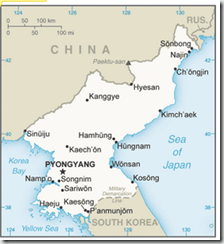#16,830
Four days ago, in Reports Of Another `Epidemic' In North Korea, we looked at state run media reports of an `acute enteric epidemic' in Haeju City located in South Hwanghae Province. While details were scant, much was being made of President Kim Jong-un's concern, and donation of `family' medical supplies to the region.
Gastrointestinal outbreaks are not uncommon in North Korea, where water treatment and wastewater treatment plants are often crude or in disrepair, but they rarely get this sort of mention by state media.
North Korea is also suffering from COVID, which has reportedly infected more than 4.5 million people since late April, chronic food shortages, abetted by very limited medical infrastructure, particularly outside of Pyongyang.
While the latest reports from state media remain vague about the cause of this epidemic (possibilities include Typhoid, Cholera, Giardiasis, etc.), they do convey a new sense of urgency, and describe some of the actions being taken to curb this outbreak.
These translated reports from KCNAwatch.org.
State anti-epidemic work launched in offensive way
Date: 19/06/2022 | Source: Voice of Korea (EN) | Read original version at source
The Democratic People's Republic of Korea is coping with the ever-changing anti-epidemic situation in an offensive and efficient way by scrupulously and substantially organizing and carrying on the anti-epidemic work.
The Ministry of Public Health urgently dispatched medical teams of national-level hospitals to the regions attacked by enteric epidemic and is supplying medicines to them. It is taking measures to immediately curb the spread of epidemic in cooperation with local medical workers.
The emergency anti-epidemic units and curative and preventive organs at all levels are intensifying medical check-up of entire residents to exterminate the malignant pandemic and properly grasping those in a fever in real time. On the other hand, they are encouraging the household doctors to enhance their responsibility to put the children, the old people and patients with basic and chronic diseases under medical observation and take active treatment measures.
Public health workers have been deployed in the rural communities across the country busy with farming. They are induced to strengthen cooperation with hygienic activists lest there should be any mistake in the medical check-up of agricultural workers and helpers and in disinfection.
The urban management sector has readjusted and reinforced the sewage treatment facilities and is strictly disinfecting and disposing of domestic sewage and garbage in close contact with the emergency anti-epidemic units and fully guaranteeing the hygienic security of drinking water and domestic water.
The central emergency anti-epidemic sector has built a model inspection room of second bio-safety level at the Taedong County Hygienic and Anti-Epidemic Centre of South Phyongan Province and is pushing ahead with the work to generalize it to all hygienic and anti-epidemic organs across the country. Active efforts are made to lay a firm foundation for sustainable protection of health and lives of the people.
Normally, news of what happens in North Korea stays in North Korea. Why we are hearing about this outbreak, when others have been hushed up in the past, is unknown.
